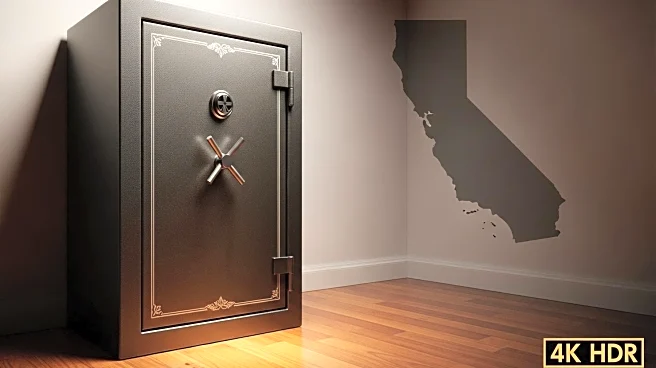What's Happening?
Governor Gavin Newsom has signed a new law in California that bans the sale of new Glock handguns, a move aimed at addressing the ease with which these guns can be modified into fully automatic weapons. The legislation targets the Glock design, which can be altered with a small plastic piece known as a 'Glock Switch,' allowing the gun to fire automatically. While Glock switches are already illegal, the new law goes further by prohibiting the sale of any new gun with a Glock-like design. This law does not affect the possession or resale of used Glocks within the state. The bill, introduced by Southern California Assemblymember Jesse Gabriel, seeks to push Glock to redesign its guns to prevent such modifications. California, the third-largest market for gun sales in the U.S., has seen significant debate over this issue, with gun store owners expressing skepticism about the law's effectiveness in reducing gun violence.
Why It's Important?
The signing of this law is significant as it represents California's ongoing efforts to address gun violence through legislative measures. By targeting the design of Glock handguns, the state aims to reduce the potential for these weapons to be modified into automatic firearms, which have been involved in several high-profile shootings. The law could influence gun manufacturers to reconsider their designs to comply with stricter regulations, potentially setting a precedent for other states. However, the law has faced opposition from Republican lawmakers who argue that it disproportionately affects Glock purchasers and limits access to popular handguns. The broader impact of this legislation may hinge on whether other states adopt similar measures and whether gun manufacturers respond with design changes.
What's Next?
The law's implementation may lead to legal challenges from gun rights advocates and manufacturers, who could argue that it infringes on Second Amendment rights. Additionally, Glock may consider redesigning its handguns to comply with California's regulations, although this would require a lengthy certification process. The effectiveness of the law in reducing gun violence will be closely monitored, and its impact could influence future legislative efforts both within California and nationally. Advocacy groups like Moms Demand Action, inspired by personal tragedies, may continue to push for broader reforms, potentially leading to more comprehensive gun control measures.
Beyond the Headlines
The law raises ethical and legal questions about the balance between public safety and individual rights. It highlights the challenges lawmakers face in regulating firearms in a way that effectively reduces violence without infringing on constitutional rights. The focus on gun design rather than ownership or usage reflects a shift in strategy that could have long-term implications for gun policy in the U.S. Additionally, the law underscores the role of advocacy groups in shaping public policy, as personal stories of loss and tragedy drive legislative change.









